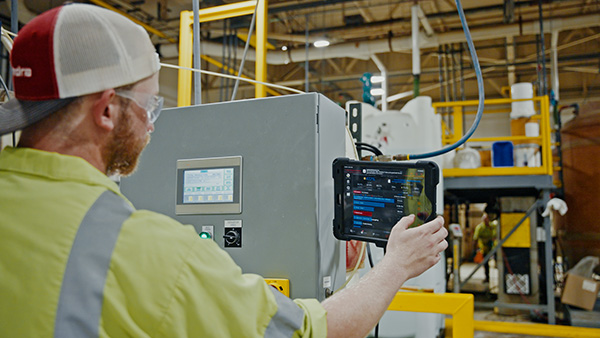Manufacturing is at a crossroads – the answer is to reskill the workforce with advanced technologies such as AI and ML for a new era.

By Blake Strickland, Senior Director of Product Management, QAD Redzone
Manufacturing is at a crossroads. Advancements in artificial intelligence (AI), machine learning (ML), and real-time data analytics promise to revolutionize the industry, compelling the current workforce to evolve rapidly just to keep pace. These technologies are beginning to make waves — assisting production processes, increasing efficiency, and reducing costs. But they will require a workforce skilled in new digital tools and methodologies.
Deloitte and The Manufacturing Institute estimate that the skills gap in manufacturing could leave 2.4 million positions unfilled by 2028, potentially costing the U.S. economy $2.5 trillion.
This gap is exacerbated by the imminent retirement of a significant portion of the current workforce, which has traditionally relied on manual processes and paper-based systems. 10,000 Americans reach retirement age every day, leaving vacancies open for a new generation of workers.
But according to McKinsey, not nearly enough Gen Z workers are walking onto factory floors to fill open manufacturing roles. And when they do, their engagement levels are often low, and they’re more likely to leave than their older counterparts. One of the main reasons? Gen Z workers expect to engage with cutting-edge technology rather than traditional manual methods.
Today’s younger, digital-native workforce insists on a work environment integrated with advanced technology. They are accustomed to digital communication, real-time information, and data-driven decision-making. Also, according to the World Economic Forum, new workers want roles that offer continuous learning and development opportunities, as well as the chance to work with innovative technologies.
This expectation goes beyond convenience — it directly impacts job satisfaction and retention. Companies that fail to meet these demands may struggle to attract and retain top talent. Because of this, reskilling the existing workforce and ensuring new hires are adept with modern technologies is imperative for maintaining competitiveness.
To address these challenges, manufacturers are investing in various reskilling initiatives such as the ones below. These programs aim to equip the current workforce with the skills needed to operate new technologies, while also attracting and retaining tech-savvy younger workers.
One effective strategy is collaboration between manufacturers and educational institutions. By aligning curricula with industry needs, these partnerships ensure graduates possess the relevant skills required for modern manufacturing roles.
A notable example is the partnership between Boeing and Embry-Riddle Aeronautical University. The aerospace titan collaborates with this leading educational institution to develop a specialized curriculum focused on advanced manufacturing technologies and aerospace engineering. This comprehensive program includes hands-on training with cutting-edge tools and techniques used in the industry to give students practical experience that prepares them for careers in the field.
Company-sponsored training programs are another vital aspect of reskilling efforts. These programs can be customized to meet specific company requirements and offer greater flexibility than conventional educational paths.
For example, General Motors (GM) is gearing up its workforce for an era dominated by electric, software-enabled, and autonomous vehicles. To stay competitive and foster career growth, GM offers extensive training and development through its Technical Learning University (TLU). Launched in 2017, TLU focuses on upskilling and reskilling skilled trades workers and salaried manufacturing engineers. The program allows employees to maintain their regular duties while participating in training sessions, benefiting thousands since its inception.
Technology itself can be an effective tool in reskilling efforts. E-learning platforms, virtual reality (VR) simulations, and interactive software provide engaging and effective training solutions.
Training Industry’s Tips for Using AR/VR for Training Manufacturing Workers provides practical advice to companies considering AR/VR for upskilling their workforce. For instance, manufacturers should conduct a needs assessment to determine what problems they are trying to solve with AR/VR. Then, select solutions that work seamlessly with relevant tools that their frontline workforce are using today.
Additionally, tools that put training in the hands of workers are growing in adoption. Frontline workers at Crest Foods, a contract packaging operation in Ashton, IL use tablets and connected worker software to create and consume training videos. This promotes positive team interactions and a culture of continuous learning as experts and frontline teams help each other upskill, reskill, and improve existing skills.
Public-private partnerships also play a critical role in reskilling the manufacturing workforce, providing funding, resources, and expertise for large-scale training initiatives.
A prime example of such collaboration is Apprenticeship Carolina, a partnership between the South Carolina Technical College System and local manufacturing companies. The program offers a unique blend of on-the-job training and classroom learning so participants gain both hands-on experience and theoretical knowledge. By integrating real-world work with education, Apprenticeship Carolina cultivates a highly skilled workforce tailored to the demands of modern manufacturing, building rewarding careers and supporting local industries with a robust talent pipeline.
As it has been since the dawn of the industrial age, the future of work in manufacturing will be shaped by ongoing technological advancements. Automation will create new opportunities for manufacturers that adapt with the right skills through continuous reskilling and upskilling.
Manufacturers must embrace a culture of lifelong learning to remain competitive. This entails leaders creating an environment that encourages continuous education and professional development. Employees should have access to resources that allow them to stay current with technological trends and innovations. Equally, experienced frontline employees should be able to contribute to the upskilling of newer employees. This provides two benefits:
Policy support from governments and industry bodies will become ever more important going forward. Creating incentives for companies to invest in workforce training as well as funding for educational programs focused on manufacturing technologies can accelerate reskilling efforts. As a result, collaboration between public and private sectors will be key to developing a robust and adaptable workforce.
One such program already in place is the federally-funded Workforce Innovation and Opportunity Act (WIOA). WIOA is designed to help job seekers access employment, education, training, and support services to succeed in the labor market. It promotes collaboration among local, state, and federal agencies and allocates funding for workforce development programs, including those focused on manufacturing.
Reskilling the manufacturing workforce is a strategic imperative for companies that want to thrive in an increasingly tech-enabled world. Investing in education, training, and continuous learning opportunities allows manufacturers to bridge the skills gap, attract new talent, and retain experienced workers. As the industry evolves, those who proactively adapt their workforce to embrace new technologies will be best positioned for success. The days of top-down manuals and three ring binders of work instructions are over. Companies should adopt systems that allow learning content to be created and shared at the edge of their organizations.

Scott Ellyson, CEO of East West Manufacturing, brings decades of global manufacturing and supply chain leadership to the conversation. In this episode, he shares practical insights on scaling operations, navigating complexity, and building resilient manufacturing networks in an increasingly connected world.